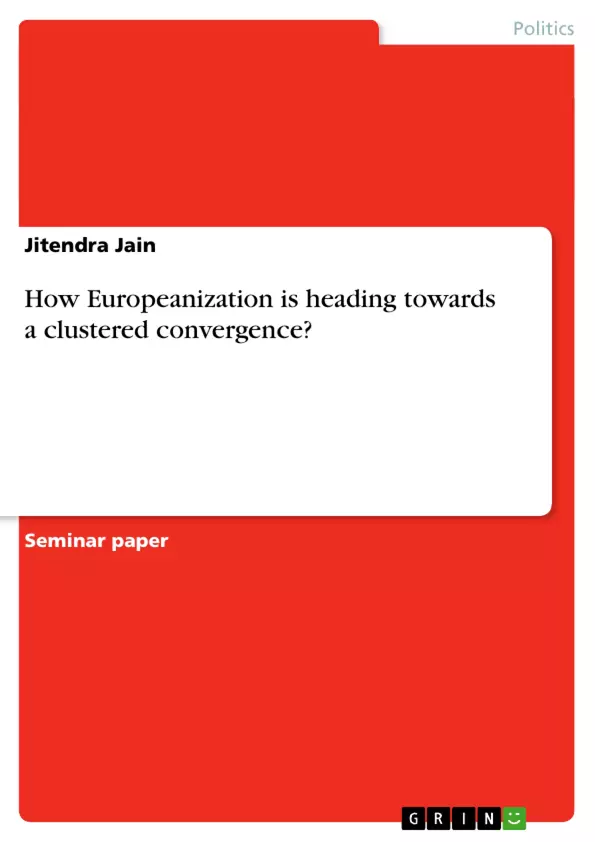The term Europeanization is becoming more and more fashionable. Some scholars including Samuel Huntington argue that citizens of European states increasingly identify themselves as such, rather than French, German etc. Various theories and terminologies are used to describe Europeanization and its future .But such attempts have failed because this term does not have single or precise meaning. Europeanization has reached a crucial stage. Scholars are debating about the trends and directions of Europeanization. Convergence, Divergence, Similarities or Differences are some of the flashpoints of discussions. Such discussions have raised various questions about Europeanization. e.g. What is the emerging picture of Europeanization and how this polarization is taking place?
This work aims to find out answers to these questions and more precisely about direction of this process i.e. how Europeanization is heading towards clustered convergence? I also narrate emerging faces and trends in Europeanization.
What is Europeanization? This work is aiming for description of present trend in Europeanization. I will begin with discussing some definitions about Europeanization. I also agree that Europeanization is not an easy term to define. Hence I will proceed further to discuss and debate about Europeanization in nutshell. How Europeanization takes place? After describing Europeanization I will proceed to discuss the logic adopted by various scholars to facilitate Europeanization.
Forthcoming section of the term paper deals with five faces of Europeanization as discussed by Johan Olsen. Discussion about Europeanization would be incomplete unless a reference is made to globalization. Hence in this paper I also intend to describe relationship between Europeanization and globalization. Concluding chapter is about ground realities and attempts to find a viable description of future trend of Europeanization.
This work is primarily based on the essays of Tanja Boerzel et al and Johan Olsen. In addition to these two essays, I have taken help from several other resources and working papers.
Inhaltsverzeichnis (Table of Contents)
- Introduction
- Deriving meaning of Europeanization
- Defining Europeanization
- Conceptualizing Europeanization
- Understanding Europeanization
- Debating Europeanization
- Comparing Europeanization and European Integration
- Identifying Europeanization with Globalization
- Assessing performance of Europeanization
- Measuring the impact of Europeanization on Domestic Policies
- Emerging Faces of Europeanization
- Concluding Observations about the trend of Europeanization
- Evaluation of Europeanization
- Convergence versus Divergence
- Convergence not moving towards one dominating model
- Dynamics of Adaptation Process
- Europeanization heading towards a clustered Convergence
Zielsetzung und Themenschwerpunkte (Objectives and Key Themes)
This work seeks to provide a detailed analysis of the concept of Europeanization, focusing on its present trends and future trajectory. It aims to answer the question of how Europeanization is heading towards a clustered convergence, examining emerging faces and trends in the process. Key themes explored in this paper include:- Defining and conceptualizing Europeanization
- Analyzing the relationship between Europeanization and globalization
- Evaluating the impact of Europeanization on domestic policies
- Exploring the dynamics of convergence and divergence in the context of Europeanization
- Examining the evolving faces of Europeanization
Zusammenfassung der Kapitel (Chapter Summaries)
Introduction
This introductory chapter introduces the concept of Europeanization, highlighting its increasing relevance and the ongoing debate surrounding its trends and directions. The chapter also outlines the main research question: how is Europeanization heading towards a clustered convergence?Deriving meaning of Europeanization
This chapter delves into the complexities of defining Europeanization, examining various scholarly interpretations. It explores the process of Europeanization, its impact on national politics and policymaking, and its relationship to European integration. This chapter also discusses how different scholars conceptualize Europeanization, emphasizing its multi-faceted nature and the challenges of providing a precise definition.Assessing performance of Europeanization
This chapter focuses on assessing the impact of Europeanization on domestic policies. It investigates how Europeanization is measured and its influence on national policymaking. The chapter also examines emerging trends and faces of Europeanization, providing insights into the evolving landscape of this process.Concluding Observations about the trend of Europeanization
This chapter summarizes the main findings of the study, offering a nuanced analysis of the future direction of Europeanization. It discusses the interplay of convergence and divergence, highlighting the potential for a clustered convergence rather than a single dominating model. This chapter further explores the dynamics of adaptation to Europeanization and concludes with observations on the evolving trends shaping the process.Schlüsselwörter (Keywords)
This work primarily focuses on the concept of Europeanization, exploring its definition, impact, and future directions. Key terms and concepts include: Europeanization, European integration, domestic policymaking, convergence, divergence, globalization, clustered convergence, and the emerging faces of Europeanization.Frequently Asked Questions
What is meant by "Clustered Convergence" in Europeanization?
It refers to the trend where European states do not move toward a single identical model, but rather group together in several distinct clusters of similar policies and structures.
How does Europeanization differ from European Integration?
Integration usually refers to the building of European institutions, while Europeanization focuses on how those processes impact domestic policies, politics, and identities within member states.
What is the relationship between Europeanization and Globalization?
The two processes are often intertwined; Europeanization can be seen as a regional response to globalization or a specific way globalization is filtered through European institutions.
What are the "five faces of Europeanization"?
Based on Johan Olsen's work, they represent different dimensions of the process, including changes in external borders, developing institutions at the European level, and domestic adaptation.
Do citizens identify more with Europe than their own nation?
This is a debated topic. While some scholars argue for an increasing European identity, others highlight the persistence of national identities alongside European ones.
- Citation du texte
- Jitendra Jain (Auteur), 2006, How Europeanization is heading towards a clustered convergence?, Munich, GRIN Verlag, https://www.grin.com/document/211768



